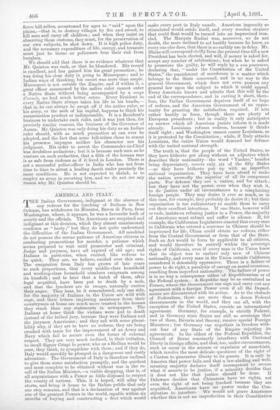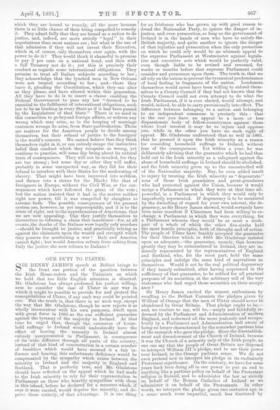AMERICA AND ITALY.
HE Italian Government, indignant at the absence of .1_ any redress for the lynching of Italians in New Orleans, has withdrawn its Minister, Baron di Fava, from Washington, where, it appears, he was a favourite both of society and the officials. The Americans are surprised and indignant at this decision, which they almost unanimously condemn as "hasty ;" but they do not quite understand the difficulties of the Italian Government. All mankind do not possess the serene patience of American citizens in conducting prosecutions for murder, a patience which seems prepared to wait until prosecutor and criminal, Judge and jurymen, have all expired of old age ; and. Italians in particular, when excited, like redress to be quick. They are, we believe, excited over this case. The emigration from Italy has grown of late years to such proportions, that every middle-class household and working-class household numbers emigrants among its kinsfolk ; and to hear that a batch of them, after legal acquittal, have been put to death by a mob, and that the lynchers are to escape, naturally excites their anger. They hear, be it remembered, only one side, for the majority of Italians in the Union are wild with rage, and their letters imploring assistance from their countrymen at home are much more trusted in the houses they reach than any statements in newspapers. The Italians at home think the victims were put to death instead of the bribed jury, because they were Italians and. the jurymen Americans; and they ask with some plausi- bility why, if they are to have no redress, they are being crushed with taxes for the improvement of an Army and Navy which fail to secure even the forms of external respect. They are very much inclined, in their irritation, to recall Signor Crispi to power, who as a Sicilian would. be sure, they think, to sympathise with them; and if they do, Italy would. speedily be plunged in a dangerous and costly adventure. The Government of Italy is therefore inclined to give them some satisfaction promptly, and the quickest and. most complete to be obtained without war is the re- call of the Italian Minister,—a visible dropping, that is, of all acquaintance with a Power so little disposed to respect the comity of nations. This, it is hoped, will allay the storm, and. bring it home to the Italian public that only one step remains, and that is a declaration of war against one of the greatest Powers in the world, capable within six mouths of buying and constructing a fleet whieh would make every port in Italy unsafe. American ingenuity so stimulated would. outdo itself, and every wooden steamer that could float would be turned into an improvised iron- clad. The Marquis Rudini was, moreover, we do not doubt, the more inclined to act hastily because he knew, as every one else does, that there is no earthly use in delay. Mr. Blaine will correspond civilly from the present time till a new President has been elected, and will, if money is asked for, accept any number of arbitrations ; but when he is asked to prosecute the guilty, he will reply by a non possumus, declaring that, "under the Constitution of the Unita States," the punishment of murderers is a matter which belongs to the State concerned, and in no way to the general Government, which does not even possess any general law upon the subject to which it could appeal. Every American knows and admits that this will be the end of the correspondence, and in cutting it short, there- fore, the Italian Government deprives itself of no hope of redress, and the American Government of no oppor- tunity for granting the satisfaction required. It acts rather hastily in form, though there are plenty of European precedents ; but in reality it only anticipates an answer which all American jurists inform it is made already. Louisiana refuses redress, because it thinks itself right ; and Washington cannot coerce Louisiana, as it is protected by the Constitution while, if Italy attacks Louisiana, the entire Union would demand her defence with the united national strength.
The truth is, that the people of the United States, as they have hitherto got along without an adjective which describes their nationality—the word "Yankee," besides being depreciatory, covers only, six of the fifty States —so they have hitherto put Up with an imperfect national organisation. They have been afraid to make the nation avowedly the superior of all its component parts. For defence they are a nation, and for attack ; but they have not the power, even when they wish it, to do Justice under all circumstances to a complaining foreign people. They may desire it ever so much, as in this case, for example, they probably do desire it ; but their organisation is too rudimentary to enable them to carry out their excellent intentions. If one State, however wild or rude, insists on refusing justice to a Power, the majority of Americans must submit and suffer in silence. • If, for example, the Californian Legislature enacted that every man in California who uttered a sentence in Chinese should be imprisoned for life, China could obtain no redress, either from the Central Government or from that of the State. Such an Act would in form be applicable to all citizens, and would therefore be entirely within the sovereign rights of California, even. if every man in the Union knew that its object was to enslave only men of Chinese nationality, and every man in the Union outside California considered it detestably oppressive. There is a failure of power to do right, a paralysis of energy on moral occasions, resulting from imperfect nationality. The failure of power is in no way a consequence either of Republicanism or of the Federal system. A Republic may be as centralised as France, where the Government can sign and carry out any agreement with a foreign Power even if all the Depart- ments are discontented with its action. As to the obstacle of Federalism, there are more than a dozen Federal Governments in the world, and. they can all, with the exception of the United. States, execute an international agreement. Germany, for example, is strictly Federal, and in Germany some States are still so sovereign that two of them, Bavaria and Saxony, receive special Foreign Ministers ; but Germany can negotiate in freedom with- out fear of any State of the Empire rejecting its agreements. In the oldest of the Federal Republics, the Council of Berne constantly interferes with Cantonal liberty in foreign affairs, and. that, too, under circumstances, such as occur in the seizure or expulsion of anarchists, which involve the most delicate questions of the right of a Canton to guarantee liberty to its guests. It is only in America that power fails, and that a law-abiding and well- meaning majority declares itself incompetent to secure what it asserts to be jui3tice, if a minority decides that it does not like that justice should be done. If Delaware decides that Chinamen have no rights, not even the right of not being lynched because they are acquitted, Americans have no power under the Con- stitution to interfere. We would ask grave Americans whether this is not an imperfection in their Constitution which they are bound to remedy, all the more because there is so little chance of their being compelled to remedy it. They admit fully that they are bound as a nation to do justice, and, indeed, are more strictly " legal " in their negotiations than most nations are ; but what is the use of that admission if they will not invest their Executive, which is, of course, only themselves over again, with the power to do it ? They would think it shameful to promise to pay 3 per cent, on a national bond, and then with a full Treasury not do it ; yet this is precisely their conduct as regards some international obligations. They promise to treat all Italian subjects according to law ; they acknowledge that the lynched men in New Orleans were not treated according to law ; and—there they leave it, pleading the Constitution, which they can alter, as they please, and have altered within this generation. All they have to do is to insert a clause enabling the Federal Government to pass any law "deemed to be essential to the fulfilment of international obligations, such law to be as binding in every State as if it had been passed by the Legislature of that State." There is no need in this connection to go beyond foreign affairs, or redress any wrong which may arise, as in the keeping of marriage contracts wrongs do arise, from State particularism. Those are matters for the American people to decide among themselves, but their refusal of justice to the foreigner is the world's concern. We cannot believe that they think themselves right in it, or can entirely escape the instinctive belief that conduct which they recognise as wrong, yet continue to practise, will some day bring about its natural train of consequences. They will not be invaded, for they are too strong ; but some day or other they will suffer, probably in some unexpected way, as they did. for their refusal to interfere -with their States for the moderating of slavery. That might have been improved into serfdom, and thence into a status for the Blacks like that of foreigners in Europe, without the Civil War, or the con- sequences which have followed the grant of the vote ; but the nation insisted that it had in the matter neither right nor power, till it was compelled by slaughter to assume both. The possible consequences of the present system are, however, as yet imperceptible, and it is to the sense of right, not to the apprehensions of Americans, that we are now appealing. Can they justify themselves to themselves in refusing a claim that murderers—for, at all events, the deaths of the Italians were legally only murders —should be brought to justice, and practically relying as against the claimants upon the wealth and strength which they possess for eonducting a war ? Italy and America cannot fight ; but would America refrain from asking from Italy the justice she now refuses to Italians ?







































 Previous page
Previous page